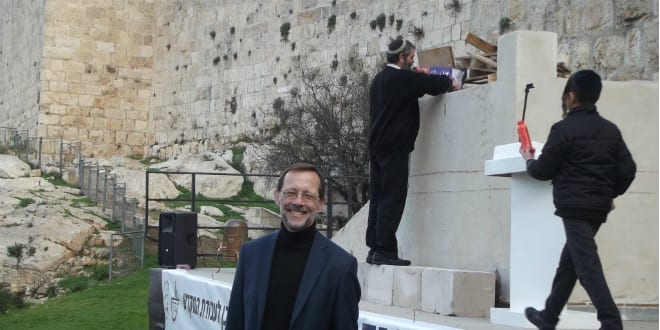For the first time ever, an Israeli politician has had the temerity to publicly declare what, for more than 2,000 years, the Jewish people have prayed for: build the Temple now.
Moshe Feiglin, head of the Zehut party, shocked participants at a Maariv/Jerusalem Post conference in Tel Aviv on Wednesday night.
“I don’t want to build a (Third) Temple in one or two years, I want to build it now,” Feiglin said to the crowd. “To build the Temple I need support, I can’t do it alone,” he said in concluding his speech.
The maverick Zehut party is steadily gaining traction in the polls under the banner of Jewish rights in the Holy Land, much to the chagrin of their left-wing opponents. A Temple Mount agenda is built into his party’s platform which calls to move government facilities to the Temple Mount and give the Chief Rabbinate authority over the site. Many have said that this is an extremist position which will lead to war, but Shmuel Sackett, co-founder of the party and one of its candidates for the Knesset, refuted these claims.

“Building the 3rd and final temple in Jerusalem has been the dream of Jews for more than 2,000 years. The goal of the State of Israel is to bring about the fulfillment of the Jewish dream and not the destruction of it,’ Sackett told Breaking Israel News. “We must educate the world as to the beauty of that dream and to the wonderful peace it will bring. Not every dream can be realized immediately but we must do what we can to move closer to that reality.”
Sackett said that his party’s name, which means ‘identity,’ had a special meaning in Israeli politics. He referred to the title of Benjamin Netanyahu’s book, A Durable Peace: A Place Among the Nations.
“Israel is not like every nation,” Sackett emphasized citing Exodus.
But you shall be to Me a kingdom of priests and a holy nation. Exodus 19:6
“In Hebrew, קדוש (holy) actually means ‘separate,’” Sackett explained. “Israel has a special role to play and when we do, there will be peace for everyone.”
Rabbi Chaim Amsalem, number two in the Zehut list, responded to those concerns simply.
“Who does not want Moshiach (Messiah)? That is what we are saying” he said to Breaking Israel News. He noted that the same concern was expressed when President Trump recognized Jerusalem as Israel’s capital. Amsalem paraphrased the president by saying, “We have tried it their way for a very long time and it has only brought more conflict. It is time to try this way.”
“We do not want war,” Rabbi Amsalem explained. “The time to build the Temple is when the entire world wants it and that time is very close indeed.”
Amsalem’s vision of unity is based on his personal experience. He is a former Knesset member for Shas, an ultra-Orthodox Sephardi party, but which draws from all aspects of Israeli society, unifying them all under one common theme; the Jewish state.
“This is what brought me to join with Feiglin and everyone identifies with this,” Amsalem said.
The Zehut party is composed of veteran political iconoclasts. Its founder, Moshe Feiglin, established the Manhigut Yehudit (Jewish Leadership) movement within the Likud party in 1995. In the 2012 Likud leadership election, his faction won 23 percent of the vote. In the 2013 elections, Feiglin was elected to the Knesset and served as its Deputy Speaker.
In 2015, Netanyahu blocked Feiglin’s growing popularity among the electorate by placing him 36th in the party list, a position that made it extremely unlikely he would sit in the Knesset even if the party was successful in the elections. Feiglin chose not to appeal the move and left to form the Zehut party.
Until recently, most media refused to list Zehut in polling results despite estimates they could win nine seats. Even the most conservative estimates are now sure they will pass the 3-seat threshold to sit in the Knesset. Considered quasi-libertarian, Feiglin is a strong advocate for increasing the availability of medical cannabis and approving its export. The party has been lambasted in the press for its pro-medical marijuana platform, a position the left-wing media usually promotes.

The real animus from the left is due to an issue that Feiglin explicitly stated he will always place foremost in his politics: the Land of Israel. Unlike other political parties which make this claim, Feiglin has a long history of fighting against abandoning land that gives strength to this campaign promise. His personal attachment to Jerusalem is undeniable, as he frequently ascends to the Temple Mount and has attended every Temple reenactment.
Feiglin has fought for this belief. In 1995 he led mass protests against the government signing agreements with Yasser Arafat. He was sentenced to six months imprisonment for sedition against the state by an Israeli court.
The party’s manifesto includes canceling signed agreements with the Palestinians, making Arab-Israeli citizens pass a loyalty test and offering financial incentives to them to emigrate elsewhere if they refuse to accept Jewish sovereignty over the land. He has also called for Israel to annex the West Bank as a solution to the conflict.
Feiglin stated that he does not have a preference between Prime Minister Benjamin Netanyahu and his main election rival Benny Gantz. Since the prime minister is the candidate who can consolidate a majority coalition, this fluidity gives the Zehut party a powerful influence and Feiglin has been dubbed “kingmaker” by political pundits.
This willingness to align with either side of the political spectrum does not come from ambiguity, but rather from a strong adherence to his highest ideal. Feiglin has stated that he will not join a government that is willing to sell out the Land of Israel. Unfortunately, in the current atmosphere of Israeli politics, that limits his options for political partners.
Source: Israel in the News

